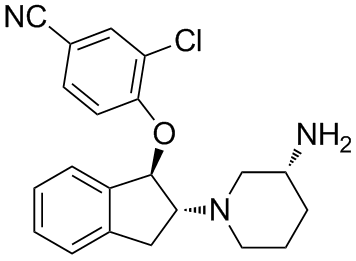No adjustment was made for anti-TNF drug type in these analyses, as the aim was to identify drug class effects. The use of anti-TNF biological agents has transformed the management of RA, although a AbMole Succinylsulfathiazole substantial proportion of treated patients demonstrate either partial or no response to these therapies. The present investigation is the first study of genetic predictors of anti-TNF response performed in Greece to date. The cohort of the Cretan RA patients analyzed in the present work is a part of the Hellenic Biologic Registry for Rheumatic Diseases that collects data from all patients who receive biologic agents in 7 Rheumatology Centers of Greece. Considering that independent replication is required to confirm definitively the association of SNPs with response to anti-TNF therapy, we performed the present study focusing on the genetic homogeneous population of Crete, which shares a common genetic and cultural background and a common environment, while it is characterized by good genealogical and clinical records and low migration rates, thus contributing to an increased reliability of the data collected. However, our study failed to detect any association between seven SNPs and response to anti-TNF therapy. The rs 6427528 CD84 SNP, which was reported recently that may serve as a useful biomarker for response to etanercept treatment in RA patients of European ancestry, will be also investigated in the Cretan population in an attempt to clarify its putative role  in this cohort. Despite substantial effort seen the last few years in the study of genetic markers of anti-TNF treatment response, only few associations have been identified. Furthermore, the genetic associations reported previously are modestly effecting, in contrast, for example, to the large genetic effects seen in studies focusing on the role of VKORC1 and CYP2C9 genes with response to AbMole Etidronate warfarin therapy. It is therefore unlikely that markers of anti-TNF response with large effect exist and we will need to analyse thousands of individuals before reproducible finding will begin to be reported. This will require large national and international collaborations and sharing of datasets. In conclusion, we present data that does not support any positive association between carriage of alleles for any of the seven SNPs examined and response to anti-TNF therapy in RA patients. However, larger studies are needed to definitively exclude the association of the SNPs under investigation in the Greek population. The enhancer of zeste homolog 2 is a SET 3-9, Enhancer-of-zeste and Trithorax) domain-containing methyltransferase that catalyzes the methylation of histone H3 to form the transcriptional repressive epigenetic marker H3K27me3. EZH2 is a subunit of the multi-enzyme complex polycomb repressive complex 2 and is involved in chromatin compaction and gene repression. Recently, EZH2 has been linked to the aggressiveness of human cancers, including lymphomas, breast cancer, and prostate cancer. Overexpression of EZH2 has been correlated with advanced stages of human cancer progression and poor prognosis. In addition, EZH2 promotes epithelial�C mesenchymal transition, a process that is associated with cancer progression and metastasis. Epidemiological studies suggest that genetic factors, including single nucleotide polymorphisms are important in mediating an individual’s susceptibility to many types of cancer. Several studies suggest an association between HCC risk and SNPs in certain genes. For example, specific SNPs in insulin-like growth factor 2 and 2R, plasminogen activator inhibitor, and matrix metalloproteinase 14 are HCC risk factors.
in this cohort. Despite substantial effort seen the last few years in the study of genetic markers of anti-TNF treatment response, only few associations have been identified. Furthermore, the genetic associations reported previously are modestly effecting, in contrast, for example, to the large genetic effects seen in studies focusing on the role of VKORC1 and CYP2C9 genes with response to AbMole Etidronate warfarin therapy. It is therefore unlikely that markers of anti-TNF response with large effect exist and we will need to analyse thousands of individuals before reproducible finding will begin to be reported. This will require large national and international collaborations and sharing of datasets. In conclusion, we present data that does not support any positive association between carriage of alleles for any of the seven SNPs examined and response to anti-TNF therapy in RA patients. However, larger studies are needed to definitively exclude the association of the SNPs under investigation in the Greek population. The enhancer of zeste homolog 2 is a SET 3-9, Enhancer-of-zeste and Trithorax) domain-containing methyltransferase that catalyzes the methylation of histone H3 to form the transcriptional repressive epigenetic marker H3K27me3. EZH2 is a subunit of the multi-enzyme complex polycomb repressive complex 2 and is involved in chromatin compaction and gene repression. Recently, EZH2 has been linked to the aggressiveness of human cancers, including lymphomas, breast cancer, and prostate cancer. Overexpression of EZH2 has been correlated with advanced stages of human cancer progression and poor prognosis. In addition, EZH2 promotes epithelial�C mesenchymal transition, a process that is associated with cancer progression and metastasis. Epidemiological studies suggest that genetic factors, including single nucleotide polymorphisms are important in mediating an individual’s susceptibility to many types of cancer. Several studies suggest an association between HCC risk and SNPs in certain genes. For example, specific SNPs in insulin-like growth factor 2 and 2R, plasminogen activator inhibitor, and matrix metalloproteinase 14 are HCC risk factors.